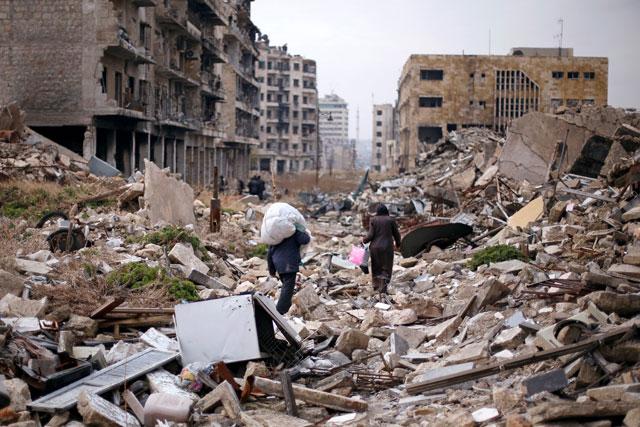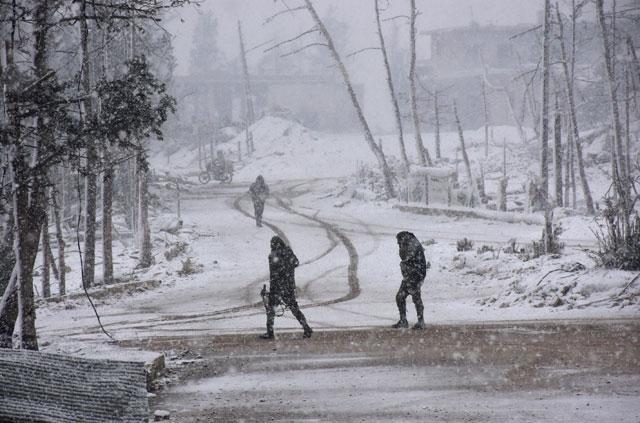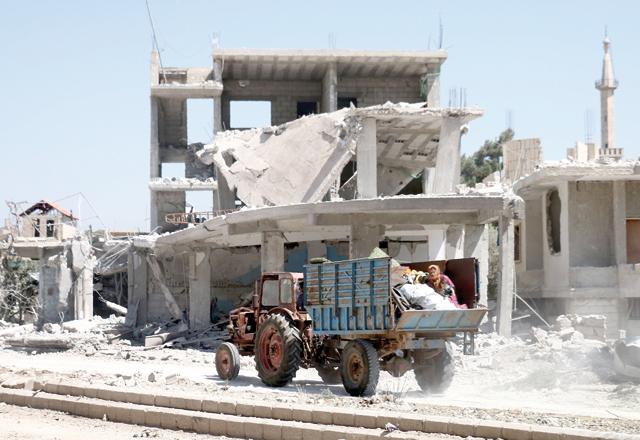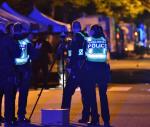You are here
Gunmen burn buses, hindering Aleppo evacuation deal
By Reuters - Dec 19,2016 - Last updated at Dec 19,2016

In this photo released by the Syrian official news agency SANA, smoke rises from green government buses in Idlib province, Syria, on Sunday (AP photo)
BEIRUT/AMMAN — Armed men burned five buses that were supposed to be used for an evacuation near Idlib in Syria on Sunday, holding up a deal to allow thousands to depart the last rebel pocket in Aleppo, where evacuees crammed into buses for hours, waiting to move.
In return for the evacuation of fighters, their families and other civilians from Aleppo, mostly Sunni insurgents have agreed that people in the villages of Al Foua and Kefraya, Shiite villages they have besieged near Idlib, should also be allowed to leave.
Videos posted on social media showed bearded men with guns cheering and shouting "God is great" after torching the green buses before they were able to reach the villages and pick up the evacuees.
State media said "armed terrorists", a term it uses for all groups fighting against President Bashar Assad, carried out the attack. Pro-Damascus Mayadeen television blamed the rebel group formerly known as Al Nusra Front.
Rebel officials said an angry crowd of people, possibly alongside pro-government "operatives", was responsible.
Hours after the incident, as the Aleppo evacuees waited on their buses, it was still unclear what impact the bus burning near Idlib would have on the wider agreement.
The commander of forces allied to Assad said on Sunday there was still a chance for states with influence over rebel groups to find a solution to evacuate civilians safely.
In a statement carried by a military news outlet run by Damascus's ally, the Lebanese group Hizbollah, the allied forces leadership said responsibility for the delay in the evacuation falls with "terrorists and their state sponsors".
Some 40 km to the northeast, hundreds of fighters and their families in Aleppo sat or stood in buses after a deal on Sunday to resume evacuations after a three-day hiatus.
The Syrian Observatory for Human Rights said there was no sign the buses had left Aleppo or the villages, and a passenger on one told Reuters he had been on the bus for four hours and was still in the city's rebel enclave.
Syrian state television, citing its correspondent in the city, said buses had started to leave east Aleppo where over 15,000 people had gathered in a square to wait. Many had spent the night sleeping in the streets in freezing temperatures.
Some buses and Red Crescent vehicles arrived at the entrance to Al Foua and Kefraya shortly after the deal was announced, according to Al Manar television, a broadcaster affiliated with Hizbollah.
Soon afterwards, reports that some of them had been burned began to circulate.
Aleppo had been divided between government and rebel areas in the nearly six-year-long war, but a lightning advance by the Syrian army and its allies began in mid-November following months of intense air strikes, forcing the insurgents out of most of the rebel-held territory within a matter of weeks.
According to Syria’s Al Ikhbariya TV news, about 1,200 civilians would initially be evacuated from East Aleppo and a similar number from the two villages.
A document cited by Al Manar television and passed to Reuters by rebels and activists said the entire deal would see 2,500 citizens leave Al Foua and Kefraya in two batches, in exchange for the evacuation of people from east Aleppo in two corresponding batches.
Following this, another 1,500 would leave Al Foua and Kefraya in exchange for the evacuation of 1,500 from the towns of Madaya and Zabadani near Lebanon, which are besieged by pro-government forces.
Once evacuees from the villages have safely arrived in government areas, Aleppo fighters and more of their family members will be allowed to leave, in return for subsequent batches of people departing Al Foua and Kefraya, Al Ikhbariya TV reported.
In the square in Aleppo’s Sukari district, organisers gave every family a number to allow them on buses.
“Everyone is waiting until they are evacuated. They just want to escape,” said Salah Al Attar, a former teacher with his five children, wife and mother.
Thousands of people were evacuated on Thursday, the first to leave under a ceasefire deal that would end years of fighting for the city and mark a major victory for Assad.
They were taken to rebel-held districts of the countryside west of Aleppo. Turkey has said Aleppo evacuees could also be housed in a camp to be constructed near the Turkish border to the north.
The chaos surrounding the evacuation reflects the complexity of Syria’s civil war, with an array of groups and foreign interests involved on all sides.
The United Nations Security Council was due to vote Sunday on a French-drafted resolution aimed at ensuring that UN officials can monitor the evacuations from Aleppo and the protection of civilians who remain.
The draft UN text, seen by Reuters on Saturday, also “emphasises that the evacuations of civilians must be voluntary and to final destinations of their choice, and protection must be provided to all civilians who choose or who have been forced to be evacuated and those who opt to remain in their homes”.
However, Russia said it would veto the draft resolution.
“We cannot support it, we cannot allow it to pass because this is a disaster. But there could be another thing which could be adopted today by the Security Council which would accomplish the same goals,” Russian Ambassador Vitaly Churkin told reporters.
He circulated a rival Russian text to council members during a closed-door meeting on Sunday ahead of a planned vote on the French draft.
Russia, which has provided military backing to Assad’s troops, has vetoed six Security Council resolutions on Syria since the conflict started in 2011. China joined Moscow in vetoing five resolutions.
A crackdown by Assad on pro-democracy protesters in 2011 led to civil war, and Daesh militants have used the chaos to seize territory in Syria and Iraq. Half of Syria’s 22 million people have been uprooted and more than 400,000 killed.
Related Articles
ALEPPO/BEIRUT — A new deal is being negotiated to complete the evacuation of rebel-held areas of Syria's east Aleppo which ground to a halt
BEIRUT — Buses carrying Syrian civilians and fighters began leaving the last rebel-held enclave of Aleppo on Wednesday after being stalled f
BEIRUT — More than 100 buses arrived on Wednesday to evacuate thousands of people from two loyalist Syrian villages that are besieged by reb



















